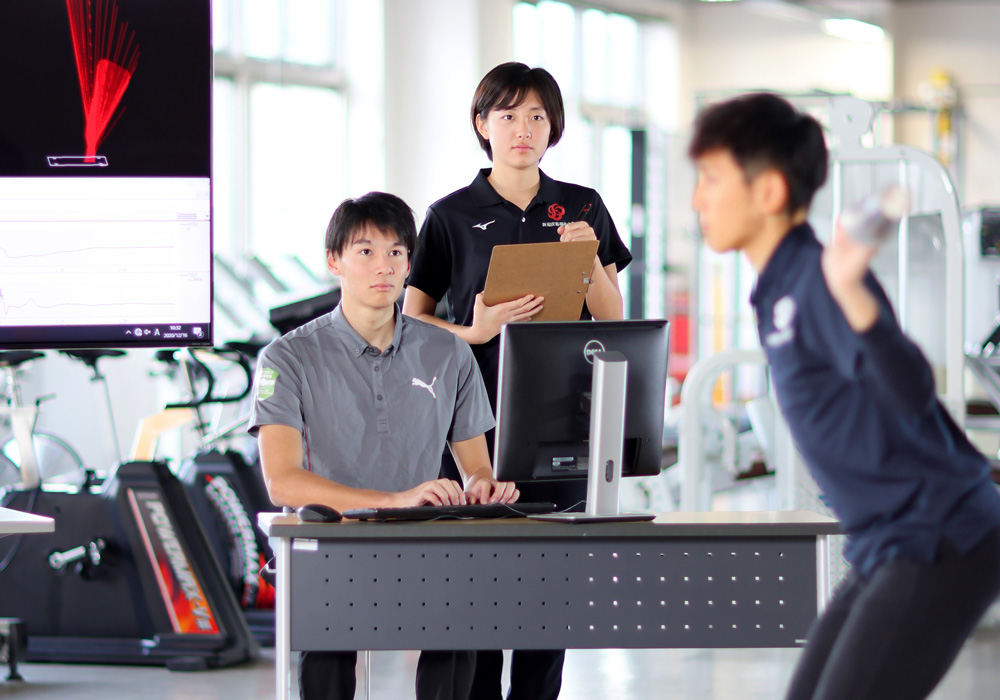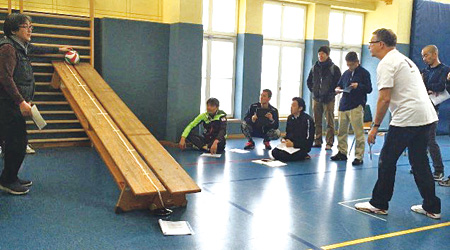
Objectives
Sports and exercises are now part of common culture for all people, not just for the young and the athletic but for children and the elderly. They are also indispensable for everyone to lead healthy, rich, and vibrant lives in the 21st century.
In our department, students explore their potential in competitive sport fields and endeavor to develop their expertise in health, management, and education. Our department aims at nurturing practicing professionals with high level of knowledge and skills that can promote people’s quality of life (QOL) through sports and exercises.
Characteristics of the Curriculum
Students learn:
- Health Medicine and Sciences to investigate sports and exercises from the viewpoints of anatomy, physiology, psychology and medicine for health;
- Coaching Sciences to examine sports and exercises from the viewpoints of physiology, psychology, biomechanics and nutrition;
- Sports Management to promote skills for management of sports facilities, local sports, and professional teams from the viewpoints of sports management, industry and culture; and
- Sports Pedagogy to obtain teaching licenses in PE and elementary school.
Qualifications and Careers
Upon successful completion of our programs, the students can obtain teaching licenses in PE. They will also be eligible for licensure examinations for athletic trainers authorized by the JSPO, health fitness programmers and instructors authorized by the Japan Health Promotion and Fitness Foundation, CSCS and CPT authorized by the National Strength and Conditioning Association, Japan Football Association C-license authorized by JFA, etc. Our graduates start their careers in various workplaces such as companies, schools, sports and health industries, manufactures, service businesses, and governmental offices. Moreover, as the number of elderly people increases in Japan and more and more experts for health and exercise are required in much wider areas, the graduates’ chances for employment in private and public health service facilities are also increasing.
International Activities
 The faculty conducts an oversea training program for students aspiring to be athletic trainers in which they attend classes and observe facilities for athletic trainers at various universities. In this program, the participants can experience different sports cultures by watching games and interacting with professional athletic trainers.
The faculty conducts an oversea training program for students aspiring to be athletic trainers in which they attend classes and observe facilities for athletic trainers at various universities. In this program, the participants can experience different sports cultures by watching games and interacting with professional athletic trainers.
Diploma, Curriculum and Admission Policies (Department of Health and Sports)
| STEPS Abilities and attitudes of qualified QOL supporters |
Diploma Policy NUHW grants a bachelor's degree to the students who have acquired the following abilities and attributes. |
Curriculum Policy NUHW implements the curriculum as follows in order to help students develop into competent QOL supporters. |
Admission Policy NUHW seeks students who have the following abilities and attributes. |
|
|---|---|---|---|---|
| S | Science & Art Ability to utilize scientific knowledge and skills in academic discipline |
Abilities to utilize their advanced scientific knowledge and skills in health and sport sciences | Our curriculum provides liberal arts and basic subjects on health and sports in the first year. In the second year, common specific subjects in health and sports are provided, followed by specialized subjects of each field of health medicine and sciences, coaching sciences, sports management, and sports pedagogy in the third and last year. The learning outcomess will be eventually evaluated by the results of qualification examinations. | Basic learning abilities in English, Japanese language, mathematics, biology etc. at the high school graduation level, correspond to the level for subjects of the entrance examination |
| T | Teamwork & Leadership Ability to work together as a team and to show leadership qualities |
Abilities to demonstrate leadership and group collaboration as sports specialists | Practical subjects are provided from the second year, such as ball sports (team sports), outdoor activities, coaching methods in various sports, recreation etc., as well as Interprofessional seminar I and II which are common subjects for all departments. The learning outcomess will be evaluated by the activities in Internship. | Abilities to carry out their work with others cooperatively and ollaboratively |
| E | Empowerment Ability to support clients by giving them powers to promote QOL |
Abilities to support clients as sports specialists based on a sense of responsibility and commitment | Practical subjects are provided from the third year, such as coaching methods in various sports, Internship, and Teaching Practice, where students utilize the basic and applied knowlege they obtain in the first and second years through active liearning. The learning outcomess will be evaluated by the activities in Internship and Teaching Practice. | Abilities to get actively involved in the field of health and sports |
| P | Problem-solving Ability to find ways of solving problems and propose better solutions |
Abilities to solve clients' health concerns and sports problems based on scientific assesment | Students study broad concept of sports sciences by learning in small groups in the first year. From the second year, a wide range of practical subjects are provided as well as those designated on the Guidelines for the Course of Study for Elementary Schools, Junior High Schools, and High Schools. The learning outcomess will be evaluated by graduation research. | Abilities to examine the issues held in the field of health and sports |
| S | Self-actualization Attitude towards the fulfillment of his/her potential |
Attitude to maintain interests in issues related to health and sports, and to participate and contribute as part of their lifelong learning | Liberal arts and basic subjects on health and sports are provided in the first year, common specific subjects in health and sports in the second year, and practical subjects of coaching methods in the third and forth year, utilizing problem based learning. Students can study in a systematic way, and at the same time study back and forth between theory and practice through lectures and practical subjects utilizing portfolio. The learning outcomes will be evaluated by graduation research. | Willingness to explore the answeres to their questions on the field of health and sports with intense interest |
| Remarks | Refer to University Regulations, Article 1 | Refer to School Manual(Gakusei Binran) | Refer to Guidelines for Applicants(GakuseiBoshu Yohko) | |
| Degree to be awarded | Bachelor of Health and Sports | |||
Notes: "STEPS" is a acronym formed from the words, which represent "the five requirements" for qualified QOL supporters.
NUHW stands for Niigata University of Health and Welfare.

